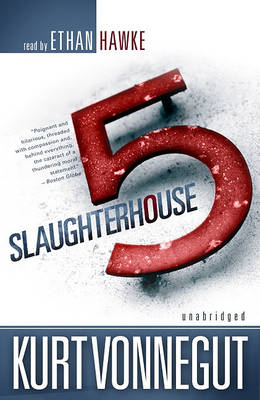Reviewed by kalventure on
For those that haven’t read this classic, SH5 is an anti-war novel that follows a non-linear life of Billy Pilgrim, who was present during the bombing of Dresden during WW2. I first read this book in 2002 during my senior year of high school. It was a post-9/11 world. Bush was pushing for war. Reading about the lesser known (at least to me) atrocities of WW2 in a time where the country was priming for war was especially impactful for me, and I think given the current situations and hostilities on the world scale it will resonate with a lot of new readers.
What is this book about? War. Time travel. Survival. Life. Death. The meaninglessness and absurdity of it all. So it goes.
There is no discernible structure to the book, and while this style of writing often drives me insane (not a fan of Bukowski for this reason) it works here because to Billy experiencing his life out of order. This is a gloriously weird book that leaves the reader guessing. Was he abducted by aliens? Or was it a defense mechanism to cope with the traumas of war? Regardless, what he learned from the Tralfmadorians helped him come to peace with the bad — it always existed, and you only experience it for a few brief moments on the cosmic scale.
All moments, past, future, present, have always existed, always will exist… when Tralfmadorians see a corpse, all he thinks is that the dead person is in bad condition in that particular moment, but that same person is just fine in other moments. Now, when I myself hear that somebody is dead, I simply shrug and say what Tralfmadorians say about dead people, which is ‘so it goes.’
'So it goes' is a phrase which is repeated throughout the book (106 times to be exact), and while that repetition bothers a number of readers it serves a very specific point. It drives home. Life will happen, we have no control over the good and the bad. It is a very Nietzschian way to look at life - only once you confront and accept the absurdity and meaninglessness of everything can you be free to create your own meaning in life. There will be pain, things will not be beautiful. So it goes.
Blog | Twitter
Reading updates
- Started reading
- Finished reading
- 14 June, 2012: Reviewed
